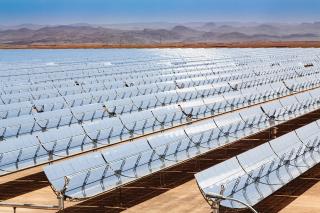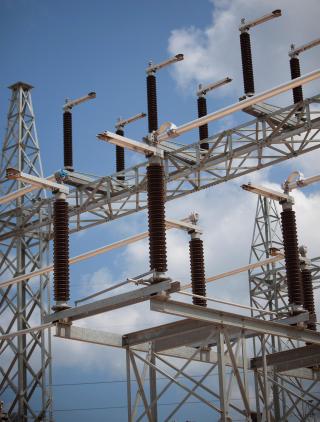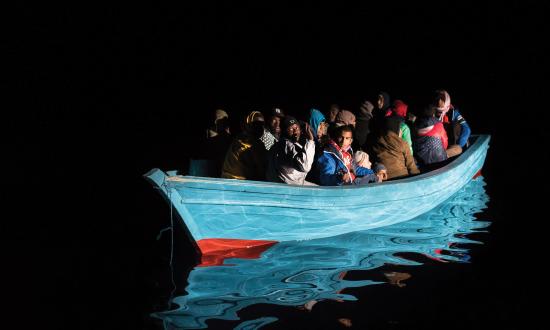When I joined the U.S. Foreign Service in 1954, Africa was seen as the lowest U.S. foreign policy priority, with little strategic importance for global affairs. Sixty-seven years later, most observers still treat Africa as a minor element of the U.S. agenda. This is profoundly myopic. The opportunities and risks in Africa, a grouping of 55 dissimilar countries, are astounding. The particulars of U.S. engagement could make the difference between a green and prosperous future or a repeat of Afghanistan.
Yet, the foreign policy intelligentsia is continuing the previous presidential administration’s mistake of viewing Africa as a battlefield for competition with China and Russia. The Biden administration must not miss its chance to break the cycle of reactive foreign policy crafted with little ambition for what a motivated policy can accomplish.
Instead of playing catch-up with China, Russia, and others, the United States should surpass the initiative they have taken in Africa. It must be so involved that it is able to spot new opportunities and recognize their inherent value, rather than seeing them as a means to sneak in another win against faraway adversaries.
As the war on terrorism wanes, the preferred paradigm of the U.S. foreign policy establishment has shifted to great power competition—a renewal of Cold War thinking that stipulates that China and, to a lesser extent, Russia pose the greatest threats to U.S. international priorities and that the goal must always be to overcome or stymie these antagonists. For Africa, the question of what Russia and China are doing there always seems to interrupt more fundamental questions about African activities and how the United States can contribute. As a consequence, U.S. engagements in Africa lately have been framed less as worthy endeavors in their own right and more as the moving of pieces on a continental chessboard situated between East and West.
A True Pivot
Every recent U.S. president has launched a signature Africa program: President Donald Trump’s was Prosper Africa, which sought to incentivize business deals with African nations for the explicit purpose of competition with Russia and China. The Biden administration promised to “reboot” the project, asking Congress for an another $80 million. But under President Joe Biden, great power competition will remain the underfunded program’s organizing principle. U.S. adversaries are not making these mistakes. When China finances and builds a multibillion dollar railway in Kenya, its primary consideration is not how it might erode U.S. influence.
Chinese and Russian projects in Africa are, in general, a bad deal for Africans. Most of China’s power projects have been in coal and gas. Chinese logging projects are devastating the Congo Basin rainforest, and foreign trawlers from China are depleting fish stocks off African coasts. Chinese companies secure many of their highly profitable projects, such as in fishing and mining, through corruption and bribery, while depriving African workers and businesses of their homeland’s resources. When Chinese companies do hire Africans, they treat them as cheap, disposable labor and abuse them with impunity. When China delivers major infrastructure projects, they often are attached to coercive debt-trap loan schemes. For its part, Russia has little to offer Africans beyond more arms and mercenaries to prolong its wars.
There is little question that Chinese and Russian projects exploit Africa and Africans, but to the extent that Chinese and Russian engagement is a problem for Africa, the United States must recognize that it is Africa’s problem to manage, and not the role of American diplomats to paternalistically second-guess. Instead, the United States must demonstrate the unique value of American involvement on its own terms. It has a strong argument to make, but delivering on it will require a forward-looking redoubling of U.S. diplomacy and engagement—a true pivot to Africa.
Aid, Investment, Diplomacy
U.S. efforts must be distinguished by their substance. Peace and security are some of its strongest historical capabilities in this respect. The United States has a long history of conflict resolution in Africa through diplomatic means. It must work tirelessly toward an end to the catastrophic wars in Ethiopia and Cameroon and the simmering militant conflicts in the Democratic Republic of the Congo, Nigeria, Somalia, Mozambique, and across the African Sahel. It must be proactive if it is to prevent the establishment of Afghan-style states run by militants, as African leaders, civil society, and the United Nations are warning.
Meanwhile, the Pentagon has stated that African terrorist groups, including those with ambitions to strike the United States, have grown so powerful in the face of faltering international counterterrorism efforts that it can hope only to “contain” rather than “degrade” them. Besides preventing the creation of another caliphate in Africa, the lesson of the U.S. experience in Afghanistan and the Middle East is that the nation must not wait for a terrorist attack based in the region to be launched on U.S. soil to grant Africa the policy priority it deserves.
Working to improve socioeconomic circumstances for Africans through aid, investment, and diplomacy strikes at the heart of the problem. Unfortunately, the popular framework for security observers in Washington has focused on ever-more advanced submarines, bombers, and nuclear weapons to counteract Russia and China, while, as a hobby, hatching projects in Africa to stop the encroachment of these foes. While these projects—such as Prosper Africa—often are of sound design, the resources and manpower devoted to them are unserious.
The United States must see African aid, development, and investment as worthy security projects in their own right. Investments in sustainable agriculture, clean power, infrastructure, and finance are waiting for the United States to take the lead. Meanwhile, African militancies grind on, their recruitment fueled more by hunger, desperation, governance failures, and repressive crackdowns than by fantasies of global Islamist jihad. A redoubling of U.S.–Africa projects will cost far less, and deliver far greater value, than tens of billions of dollars sunk into another new aircraft or ship.
It will be crucial to first sell the American public on a pivot to Africa. Despite the diminishing returns, it is easy to argue to the public that pouring more money into the defense budget makes the United States safer while creating jobs. It will be more challenging to communicate how African engagement is critical for accomplishing these goals. Yet, I am optimistic, if only because the risks of ignoring Africa are matched by the opportunities of U.S. involvement there. The potential for security, sustainable agriculture, renewable energy, trade, and better governance is simply tremendous. The mutual benefits that could be realized under a more proactive approach are impossible to ignore. But officials and experts will need to believe it themselves first, and the continuation of great power competition narratives for U.S.–African relations is a worrying sign. The United States must not be stuck in this outmoded and colonial way of thinking.









